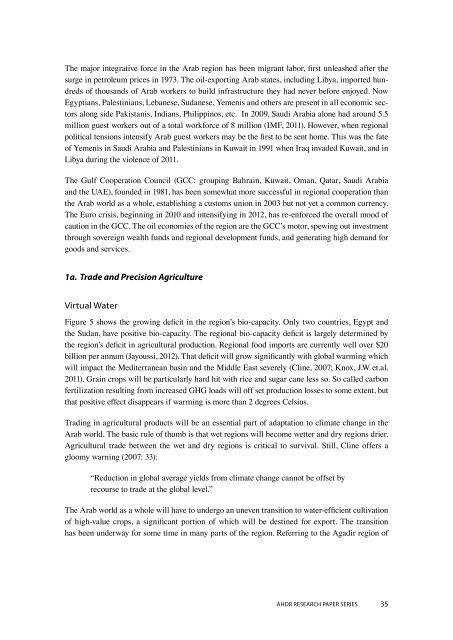The Political Economy of Climate Change in Arab Countries
The Political Economy of Climate Change in Arab Countries
The Political Economy of Climate Change in Arab Countries
Create successful ePaper yourself
Turn your PDF publications into a flip-book with our unique Google optimized e-Paper software.
<strong>The</strong> major <strong>in</strong>tegrative force <strong>in</strong> the <strong>Arab</strong> region has been migrant labor, first unleashed after thesurge <strong>in</strong> petroleum prices <strong>in</strong> 1973. <strong>The</strong> oil-export<strong>in</strong>g <strong>Arab</strong> states, <strong>in</strong>clud<strong>in</strong>g Libya, imported hundreds<strong>of</strong> thousands <strong>of</strong> <strong>Arab</strong> workers to build <strong>in</strong>frastructure they had never before enjoyed. NowEgyptians, Palest<strong>in</strong>ians, Lebanese, Sudanese, Yemenis and others are present <strong>in</strong> all economic sectorsalong side Pakistanis, Indians, Philipp<strong>in</strong>os, etc. In 2009, Saudi <strong>Arab</strong>ia alone had around 5.5million guest workers out <strong>of</strong> a total workforce <strong>of</strong> 8 million (IMF, 2011). However, when regionalpolitical tensions <strong>in</strong>tensify <strong>Arab</strong> guest workers may be the first to be sent home. This was the fate<strong>of</strong> Yemenis <strong>in</strong> Saudi <strong>Arab</strong>ia and Palest<strong>in</strong>ians <strong>in</strong> Kuwait <strong>in</strong> 1991 when Iraq <strong>in</strong>vaded Kuwait, and <strong>in</strong>Libya dur<strong>in</strong>g the violence <strong>of</strong> 2011.<strong>The</strong> Gulf Cooperation Council (GCC: group<strong>in</strong>g Bahra<strong>in</strong>, Kuwait, Oman, Qatar, Saudi <strong>Arab</strong>iaand the UAE), founded <strong>in</strong> 1981, has been somewhat more successful <strong>in</strong> regional cooperation thanthe <strong>Arab</strong> world as a whole, establish<strong>in</strong>g a customs union <strong>in</strong> 2003 but not yet a common currency.<strong>The</strong> Euro crisis, beg<strong>in</strong>n<strong>in</strong>g <strong>in</strong> 2010 and <strong>in</strong>tensify<strong>in</strong>g <strong>in</strong> 2012, has re-enforced the overall mood <strong>of</strong>caution <strong>in</strong> the GCC. <strong>The</strong> oil economies <strong>of</strong> the region are the GCC’s motor, spew<strong>in</strong>g out <strong>in</strong>vestmentthrough sovereign wealth funds and regional development funds, and generat<strong>in</strong>g high demand forgoods and services.1a. Trade and Precision AgricultureVirtual WaterFigure 5 shows the grow<strong>in</strong>g deficit <strong>in</strong> the region’s bio-capacity. Only two countries, Egypt andthe Sudan, have positive bio-capacity. <strong>The</strong> regional bio-capacity deficit is largely determ<strong>in</strong>ed bythe region’s deficit <strong>in</strong> agricultural production. Regional food imports are currently well over $20billion per annum (Jayoussi, 2012). That deficit will grow significantly with global warm<strong>in</strong>g whichwill impact the Mediterranean bas<strong>in</strong> and the Middle East severely (Cl<strong>in</strong>e, 2007; Knox, J.W et.al.2011). Gra<strong>in</strong> crops will be particularly hard hit with rice and sugar cane less so. So called carbonfertilization result<strong>in</strong>g from <strong>in</strong>creased GHG loads will <strong>of</strong>f set production losses to some extent, butthat positive effect disappears if warm<strong>in</strong>g is more than 2 degrees Celsius.Trad<strong>in</strong>g <strong>in</strong> agricultural products will be an essential part <strong>of</strong> adaptation to climate change <strong>in</strong> the<strong>Arab</strong> world. <strong>The</strong> basic rule <strong>of</strong> thumb is that wet regions will become wetter and dry regions drier.Agricultural trade between the wet and dry regions is critical to survival. Still, Cl<strong>in</strong>e <strong>of</strong>fers agloomy warn<strong>in</strong>g (2007: 33):“Reduction <strong>in</strong> global average yields from climate change cannot be <strong>of</strong>fset byrecourse to trade at the global level.”<strong>The</strong> <strong>Arab</strong> world as a whole will have to undergo an uneven transition to water-efficient cultivation<strong>of</strong> high-value crops, a significant portion <strong>of</strong> which will be dest<strong>in</strong>ed for export. <strong>The</strong> transitionhas been underway for some time <strong>in</strong> many parts <strong>of</strong> the region. Referr<strong>in</strong>g to the Agadir region <strong>of</strong>AHDR RESEARCH Paper series35
















